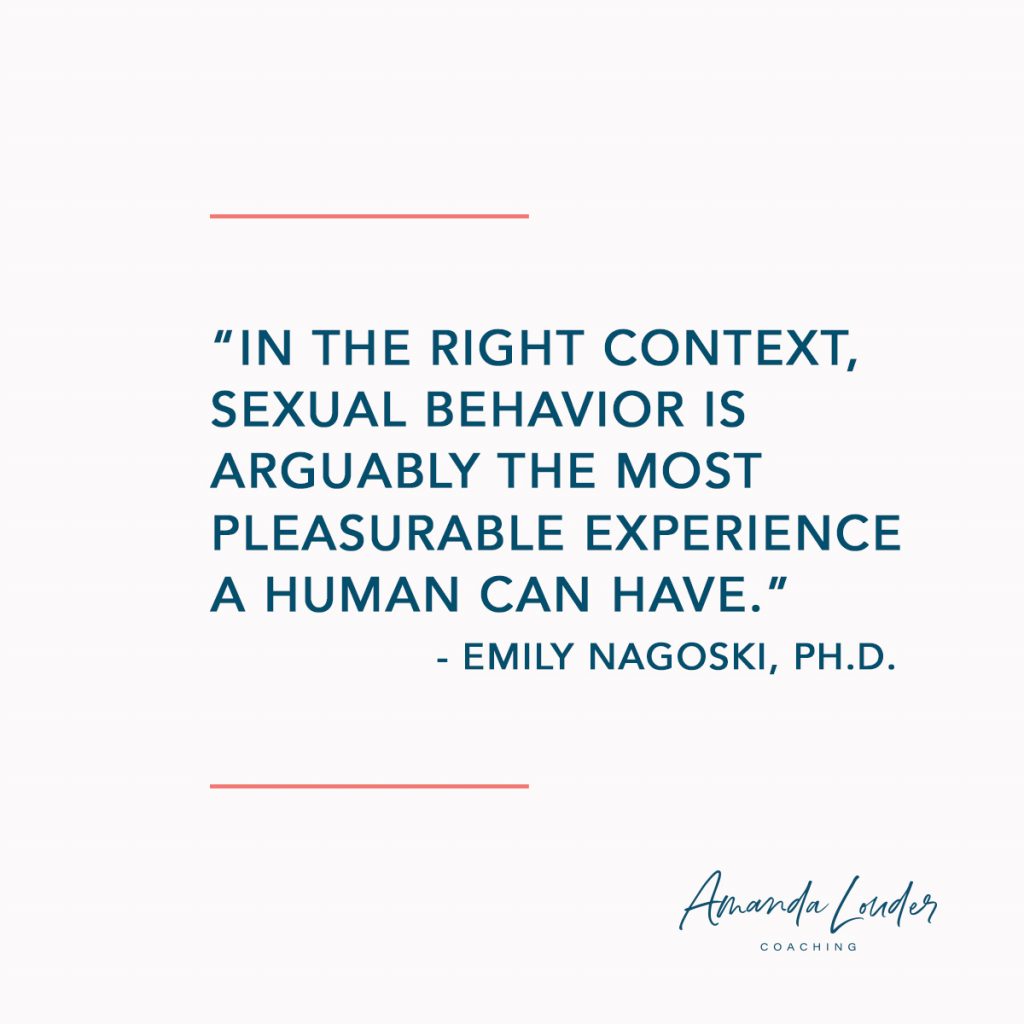
It’s all about context. We all want to feel emotionally connected to our spouse but are we sabotaging that with what we’re thinking about and focusing on? When you’re working on the mountain of laundry and your husband starts to help you, do you think, “He’s so supportive!” Or do you think, “It’s about time!” Context! And sex is all about context. Listen to this episode to find out why and what you need in order to have an amazing sex life!




Show Notes:
Follow Amanda on Facebook and Instagram.
Join Amanda’s Private Facebook Group.
References for this episode:
Come As You Are by Emily Nagoski, Ph.D.
Show Summary:
Last week we talked about sexual accelerators and brakes, and that so many of these accelerators and brakes are about context. So today, I want to dive in more about that context so you can get some ideas of how to shift things for you. If you haven’t listened to last week’s episode, I suggest you do before you listen to this episode.
In the book Come As You Are by Emily Nagoski, Ph.D. it says “In the right context, sexual behavior is arguably the most pleasurable experience a human can have. It can bond us with our partners, flood us with happy chemicals, satisfy deep biological urges, and transport us to spiritual heights. In the wrong context, though, it can literally feel like death. Depending on the context, sex can vary almost infinitely, from delicious to disgusting, from playful to painful – and.. sometimes, it’s two conflicting things at the same time.”
Context changes how your brain responds to sex and sexual stimuli. That doesn’t JUST mean that you need to set the mood with candles, music, and lingerie (although that can help for many) but it also means that when you are in a place where sex is a possibility, certain things may activate that accelerator that may not otherwise. And when you’re in a not-so-sexy context, that same thing may hit the brake.
For example – has your spouse ever grabbed your boobs or spanked you on the butt while you are in the middle of making dinner? For most women I know, doing the grabbing and spanking in this context is a major turn off. Your mind is focused on dinner, kids, homework, after-school activities. It is not in a sexy frame of mind. So doing this immediately hits the brakes. Now, on a vacation with your spouse or in the middle of sexy time, this same thing can hit the accelerator. Your brain is in a place where it can use his advances to help increase your arousal instead of squashing it. You want him to grab your boobs. You want to be spanked. Context.
Let’s try another example. Say your spouse comes home from work and you are trying to fold the mountain of laundry. If he comes over and starts folding laundry with you. You could think “he’s so supportive and helpful.” This way of thinking is going to make it easier to have more erotic thoughts. But if you are feeling frustrated and resentful about how much laundry you have to do, you may be thinking something like “of course he should help, it’s his laundry too! They are his kids too.” And this would not get you in a sexy frame of mind.
So many women come to me and say “I want to feel more emotionally connected to him.” Now think about that laundry example. Does thinking “This is his laundry too, it’s about time he helps!” make you feel emotionally connected to him? Nope. I’m guessing that thought creates more of a disconnect. But thinking “He’s so supportive and helpful.” Does that make you feel more emotionally connected to him? I would bet it does. Because it’s not actually about what he is doing (or not doing) that makes you feel connected to him. It’s what you are thinking about it.
Learning to recognize the stories you tell yourself, the things you think and believe about yourself, your husband, your marriage, your sex life, and your life in general play a very large part in your ability to feel desire, arousal, and thinking sexy thoughts. When you think emotionally connecting thoughts, on purpose, that is going to help you feel more emotionally connected to him, which will help push your accelerator. You create the context.
Guess what else plays a part in context? Your overall mood, stress, and previous trauma. Each of these plays a part on whether or not your sexual accelerators are going to be working or if your brakes are going to call the shots.
I want you to think about right after you got married, before having kids. You’ve come home from your day of school or work, you are snuggling on the couch, maybe hands start to wander, arousal and desire kick in, and you’re off to the races.
Now think about how things are 2 months after having a baby. Your husband comes home from work or school. You go to bed and quickly drift off to sleep knowing that you have little time before the baby wakes up for the next feeding. Your husband snuggles in next to you. His hands start to wander, and you are awoken from your precious sleep. He’s touching your changed body, your boobs that hurt, your vulva and vagina that are still healing, the same body that is being pawed all day by your newborn. It makes complete sense that even though his actions might be the same, the context for you is completely different, so you’re NOT in the mood.
Now fast forward 22 years. You work all day. You’ve got teenagers that are struggling mentally and socially. Another one that wants to hang out with friends until all hours of the night. Pre-teens that are clingy and want your attention or want nothing to do with you and you wonder why. And then your husband comes home and wants his “needs” met too. You’re feeling self-conscious about your aging body. You’re still exhausted. The last thing you want to do is take care of a grown-man.
These are the stories I hear time and time again. Women are mentally and physically exhausted from taking care of everyone. And even the ones who feel loved and supported by their husband still take on much of the mental load as well as feeling like it is their job as the wife to keep their husband happy. Fear of him leaving, having an affair, watching porn may play into it. Or maybe it’s just your own beliefs that it’s a woman’s job to take care of her husband sexually. And maybe the past has told you that if you say no, there will be consequences. Maybe it’s just that his disappointment is obvious. Maybe he withdraws. Maybe he pouts, whines. Maybe he gets angry. And how he is feeling radiates through the house, and you’ve been taught your whole life that it’s your job to keep everyone happy. So you give in. You do your duty. You feel terrible. He seems ok for the moment, but he’s actually not satisfied either because what he really wants, more than sex, that connection and intimacy. And around and around we go.
I want you to know that you are normal. All of this is normal. And I’m not trying to educate you so that you can use this as an excuse for shutting down sex. Quite the opposite. I’m doing it so you can work WITH your mind and your body, understand it, so that you can release some of these brakes, create better context, so things will get better!
In coaching, I help you create more sex-positive contexts. This isn’t about putting on rose colored glasses for situations that actually stink. This isn’t about believing things that aren’t really true. But it’s about being intentional at creating better contexts. Like the laundry situation. Yeah, your brain may say “It’s about time he helped!” But we know that doesn’t create good context. So it’s about changing that, so whether it happens on default or is very intention, you’ll have more connecting thoughts that help you create the marriage and sexual relationship you actually want.
When I meet with women in one of my free consultations, I always ask them what they want. They’ve spent so many years doing what everyone else wants, they don’t even know what they want for themselves. Most tell me they’d be fine to never have sex again. Which feels very true. But they also know that they want a happy marriage, and that is never going to have happen if their husband never has sex again. But when it comes down to it, what nearly every woman I talk to actually wants is a happy, healthy marriage and sexual relationship. But that seems so far out of their reach. They have no idea how to create. Because if they did, they would have done it already. But the thing is, I do. I know how to help you create that. And that doesn’t mean giving your husband sex whenever he wants it. It means creating context where you want it too.
In order for a woman to be sexual (and this is most women, but not necessarily all) we need three things.
- Low stress
- High affection
- Explicitly erotic
What do those three things mean? Let’s break them down.
- Stress: When you are stressed, your brain interprets just about everything as a potential threat. Cortisol levels rise. The stress response (fight, flight, freeze, or fawn) kicks in. The sexual response is inhibited. According to studies, stress reduces sexual interest in 80-90% of people and reduces sexual pleasure in everyone – even the 10-20% of people for whom it increases interest. In order to be sexual, we have to eliminate what stresses we can. But let’s face it, we can’t eliminate all of our stress. That’s just impossible. So we also have to learn how to respond better to stress (which is something I teach my clients how to do) and complete the stress cycle so that we can return to a better state in our mind and body.
- High affection: Women like lots of affection, but it has to come in stages. They need more non-sexual affection, especially at first. Holding hands, hugging, kissing. Think about what affection looked like before you got married. If you haven’t listened to Episode 137 – The Five Gears of Touch I highly suggest you do. This will give you a good guide of how to drive up arousal through touch. Here’s a hint, it doesn’t start with grabbing boobs while she’s making dinner.
- Explicitly erotic: This is one of the hardest things for women who are from more conservative backgrounds to understand. We need things that are erotic to help us be sexual. Watching a sexy movie, reading a sexy book, anticipating having sex, knowing your partner desires you, or noticing your partners arousal. We need the erotic, the fantasy, the excitement in order to be sexual. Yet many women equate those things as being wrong or inappropriate, when it was actually how God designed our brains and our bodies to work. Now these things can look different for every individual. But most women need it in some way.
So, these three things, low-stress, high affection, and explicitly erotic are what we need to create the best context for the sexual experience. These are all things that work on in my program. How to create that context for yourself in a way that is in alignment with your values and goals.
Don’t forget, my next group starts Wednesday, November 10 at 10am MT. If that day and time doesn’t work for you, you can set up a consultation with me and we can discuss future groups and dates. You can go to the homepage of my website AmandaLouder.com to sign up.



